-Stardust
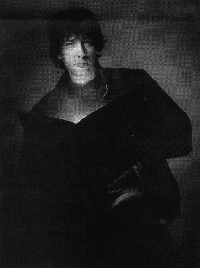
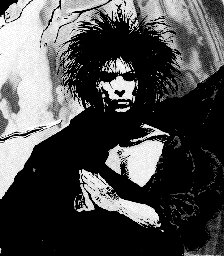
"There
was one a young man who wished to gain his Heart's Desire. "
-Stardust


Neil Gaiman
(Left hand picture scanned in by Eden Miller)
Ah, Neil Gaiman. Without a doubt my favourite author, and often for quite selfish and personal reasons. Neil's Sandman comic books reawoke my love in fantasy and magic and make me feel like there was truly something deep and beautiful about life and living. So if any of the following sounds like gushing fangirl praise, well, tough. I think he deserves it. And I don't give you grief over how you write your websites now, do I.
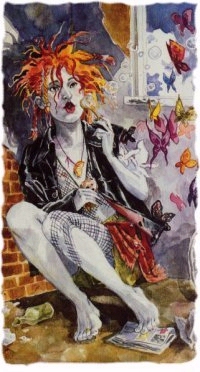 |
Since I mentioned Sandman, I may as well start with it as the best example of Newil's work, because it's, well, the most major piece he has produced so far. 'Sandman' ran for eight years, beginning in 1987 and ending in 1995, and is rightly hailed as one of the landmark series in the world of comics Set in both this world and others, it concentrated on the story of Morpheus.the Sandman of the title and Lord of Dreams. But unlike other comic books, Gaiman used this initial premise to tell stories that covered a far broader canvas than just Morpheus's life. In some, Morpheus was a central figure; in others, he featured barely if at all. And so Gaiman worked to create a rich and diverse mythos, populated with characters such as Morpheus's family, the Endless (including the terribly sweet Delirium, pictured here,); the witch-woman sometimes known as Larissa; Robert 'Hob' Galding, who has lived for over 600 years simply by choosing not to die; and Barnabas, the talking dog who looks after Delerium. |
| What made Sandman so special, however, were not the worlds that were created but the stories that were told. Whether they were a short, one-issue piece or a tale that took several months in the telling, Gaiman told them all with an authorial voice that made you believe in magic, backed up with concepts and plot-developments that were as astounding as they were original. So we had Lucifer resigning as prince of Hell; a convention of serial killers listening to the monster who had inspired them all; and one of the most terrifying horror stories of all time to take place within just twenty-four hours. On top of all that we were tantilised with throw away details of events that happened outside the tale but which we were never told too much about. How did the Old Ones come to escape Death for so long? What was the event that turned Delight into Delirium? What was Morpheus's relationship with Titania, queen of the Fae, or Elinora? What happened in Lady Joanna Constantine's past that she was so afraid of? We'll never know. The fact was these events happened, and their results coloured Sandman's stories perfectly. | 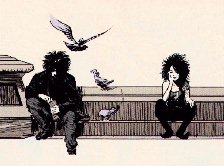 |
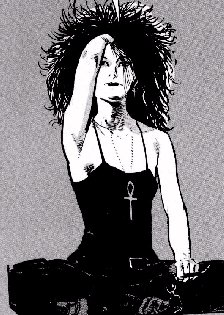 |
There were occasional moments of weakness. I don't think 'A Game of You' was as successful as Gaiman intended it to be, particularly through his mishandling of the transsexual character. And some of the earlier stories had a slightly odd stop-start feel to them, interrupting their own narrative flow to include other one-issue stories whose appearance would have been jarring, were they not so well written. But at the end of the day, Sandman was a brilliant work that should really be allowed the status of literature simply for the sheer depth and breadth of its ideas and concepts. It is just a pity that it had to end, but then all good things, and all that. And the ending has to be amongst one of the most beautiful ever written. |
  |
Sadly though, after Sandman, it is difficult to know which exactly to point you in the direction of, if you're interested. Of course, many people may have heard of "Good Omens" but that's probably more due to the fact that it was co-written with Terry Pratchett (who I don't reccommend as he's had enough publicity already and I don't think his last few books were up to much.). Apart from that there are few other actual novels that spring to mind, except perhaps for "Neverwhere". Gaiman's writing seems to be geared more towards collections of short stories, although the occassional oddity such as the official companion to "The Hitchhiker's Guide to the Galaxy" do turn up. |
| If, however, you loved and miss "Sandman" then I highly recommend "Stardust", a grown-up fairy tale that Gaiman wrote and published in four parts soon after finishing "Sandman". It is a beautiful work, richly illustrated by Charles Vess, and full of the magic and mystery that has attracted mortals to the faerie kingdom since time began. It also contains the death and danger that can hide behind the glamour and that few admit to being there. But this is also for the good because nothing can be totally one thing or the other, and sometimes the darkness is contrast enough to make the light shine that much brighter. Of course you *could* buy the version without the Vess illustrations but that seems to destroy half the pleasure of the work. | 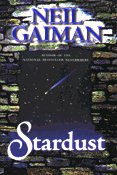 |
 |
Gaiman's most recent work, "Smoke and Mirrors", was released sometime in 1998 after "Stardust" finished, and since then he seems to have gone a bit quiet. However, there are rumours that he is currently penning a new Sandman story to be published later in 1999, and even if this doesn't happen, the stuff he has produced so far has been magnificent. If you want to learn more, I suggest you check out The Dreaming: The Neil Gaiman Page for starters. |
(Please note, The above images of Death, Delirium and Sandman are the characters of Neil Gaiman, and the images are copyright DC, or the respective artists (Dave McKean, Chris Bachalo, Mike Dringenberg, John Totleben, Charles Vess, Jamie Hewlett, Joe Quesada, Vince Locke, Moebius, Jon Jay Muth, Bill Sienkewicz and P. Graig Russell) They are used without permission of their owners because I'm recommending that you go out and buy more of their work. Similarly with the other pictures; they are not mine are used without permission of their owners because I'm recommending that you go out and buy more of their books. However, should any of those who's work I display here disapprove, please can they mail me and I'll remove them.)
Back to
the previous author
Back to the Authors' Reviews
Back to the Books of Reviews
Back to the Library
[Lois McMaster Bujold] [Neal Stephenson] [James Bibby] [Neil Gaiman]